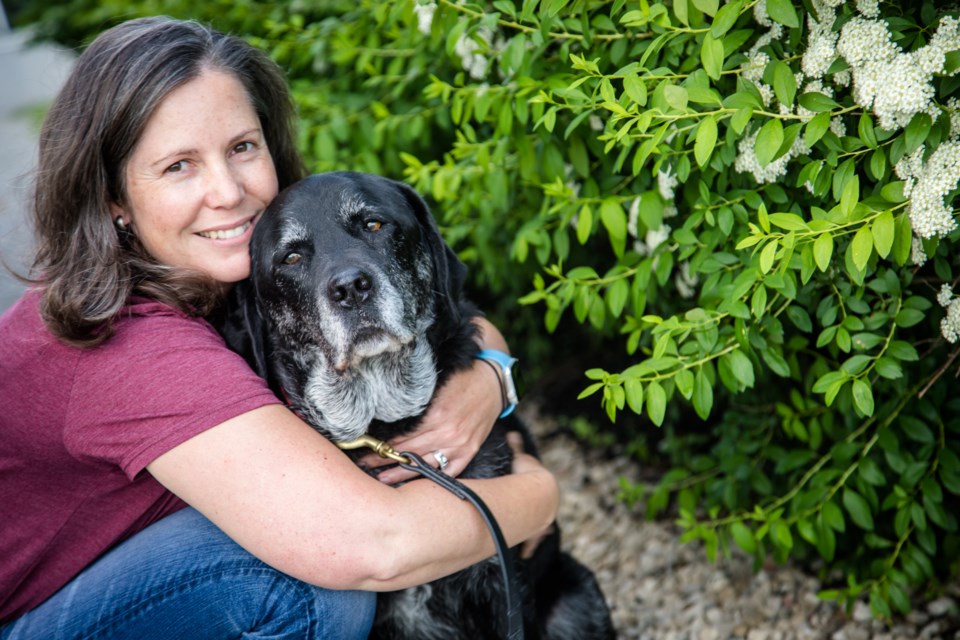ROCKWOOD - Like their owners, some pets may have experienced a bit of weight gain during the pandemic, but if that weight is starting to cause health problems, a new mobile clinic in Rockwood is offering to help with the added pounds.
Kirsten Graham is a veterinarian with nine years of experience and the owner of Graham Mobile Veterinary Weight Management Services, a mobile clinic which helps pet owners develop tools and strategies to manage overweight or obese pets.
“I worked in practice for nine years and saw a lot of pets who were overweight or obese, but didn’t know that much about how to manage them other than the basics," said Graham, "and then I took a job at a pet food company called Royal Canin."
Graham said she worked on the weight management team at Royal Canin for seven years, becoming a subject matter expert. During that time, her passion for pet weight management developed.
"I really got to learn the importance of choosing the right diet, feeding them accurately and all sorts of tips and tricks to help pets who are overweight, or to avoid overweight pets in the first place," she said.
Graham went to the University of Liverpool to visit Dr. Alex German, one of the world’s leading experts on obesity management in pets.
“He has a weight management clinic affiliated with the University of Liverpool and I joined him and his lovely vet tech Georgia, and spent a week shadowing them," she said about the experience.
“And I got back from that trip thinking, ‘We need something like this in Canada.’”
Graham said North American data found 60 per cent of dogs and cats that visit a veterinary clinic are reported to be overweight or obese.
“For me in practice, as I do some clinical work on the side, and I would say at least half the pets, if not more, who come through the door need a conversation about weight management,” said Graham.
Recognizing that there is a lot of stigma around weight, Graham said there are genetic factors and underlying causes to pet obesity, which is why she does not refer to overweight or obese pets as 'fat.'
"It's a disease, and if we treat it like that, then we take away any judgment."
Graham mentions obesity can cause arthritis and other health issues for animals. For cats, obesity can lead to diabetes and higher risk while being under anesthesia during surgery.
“A lot of the diseases that are associated with being overweight is what we see in people,” she said.
When visiting patients at their home, Graham does a full physical exam to determine any underlying conditions, followed by interviewing the owners about the pet’s eating habits and lifestyle. Graham will also weigh pets on a scale, which can go up to 400 pounds. From there, a plan is developed with the owner.
Graham only decided recently to make house calls after the College of Veterinarians in Ontario changed the rules around telemedicine during the pandemic.
She notes by making house calls, she can not only assess the patient, but also the entire environment they live in and any household challenges that may be preventing a pet from staying at a healthy weight. From there, the consultation can help lead to a higher chance of success in managing overweight or obese pets.
“I’m able to identify more things by spending time at the home than I would be able to sort out if I was talking to them over the phone or seeing them at the veterinary clinic," said Graham.
When it comes to managing a pet’s weight, Graham said one common misconception owners have is to start exercising their pet more as it takes a lot of exercise to burn calories. For example, she said humans need to walk for two hours in order to burn off 300 calories.
“It's not enough to have an impact on the weight, it's still a good thing to do, but what really matters is how much calories the pet is taking in,” she said.
However, Graham mentions feeding pets less store-bought dog food, or a ‘low calorie’ dog food may cause nutrient deficiencies, and may not have added fibre to keep pets fuller longer.
“The only real weight loss diets are prescriptions,” said Graham, adding the prescribed weight loss food from veterinarians can be between 40 to 50 per cent lower in calories than a regular dog food while maintaining the proper nutritional levels.
In terms of prevention strategies, Graham suggests feeding animals precisely as you can by following the guidelines on the food packing and also weighing food with a digital scale instead of using a measuring cup.
Another tip for how pet owners can help prevent pet obesity is to ask veterinarians what they think about the pets' weight, adds Graham.
“It’s a subject everyone kind of tip-toes around,” she said, “But, if the owner brings that up, it opens the door."
